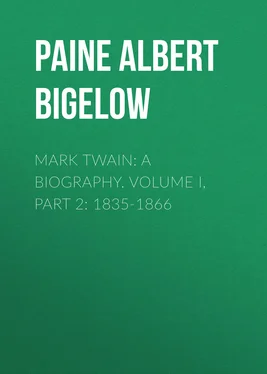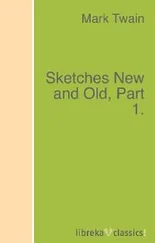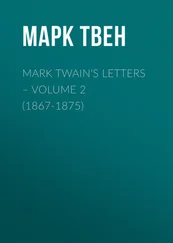Albert Paine - Mark Twain - A Biography. Volume I, Part 2 - 1835-1866
Здесь есть возможность читать онлайн «Albert Paine - Mark Twain - A Biography. Volume I, Part 2 - 1835-1866» — ознакомительный отрывок электронной книги совершенно бесплатно, а после прочтения отрывка купить полную версию. В некоторых случаях можно слушать аудио, скачать через торрент в формате fb2 и присутствует краткое содержание. Жанр: Биографии и Мемуары, foreign_antique, на английском языке. Описание произведения, (предисловие) а так же отзывы посетителей доступны на портале библиотеки ЛибКат.
- Название:Mark Twain: A Biography. Volume I, Part 2: 1835-1866
- Автор:
- Жанр:
- Год:неизвестен
- ISBN:нет данных
- Рейтинг книги:5 / 5. Голосов: 1
-
Избранное:Добавить в избранное
- Отзывы:
-
Ваша оценка:
- 100
- 1
- 2
- 3
- 4
- 5
Mark Twain: A Biography. Volume I, Part 2: 1835-1866: краткое содержание, описание и аннотация
Предлагаем к чтению аннотацию, описание, краткое содержание или предисловие (зависит от того, что написал сам автор книги «Mark Twain: A Biography. Volume I, Part 2: 1835-1866»). Если вы не нашли необходимую информацию о книге — напишите в комментариях, мы постараемся отыскать её.
Mark Twain: A Biography. Volume I, Part 2: 1835-1866 — читать онлайн ознакомительный отрывок
Ниже представлен текст книги, разбитый по страницам. Система сохранения места последней прочитанной страницы, позволяет с удобством читать онлайн бесплатно книгу «Mark Twain: A Biography. Volume I, Part 2: 1835-1866», без необходимости каждый раз заново искать на чём Вы остановились. Поставьте закладку, и сможете в любой момент перейти на страницу, на которой закончили чтение.
Интервал:
Закладка:
Palestine is desolate and unlovely. And why should it be otherwise?
Can the curse of the Deity beautify a land?
It would be easy to quote pages here—a pictorial sequence from Gibraltar to Athens, from Athens to Egypt, a radiant panoramic march. In time he would write technically better. He would avoid solecism, he would become a greater master of vocabulary and phrase, but in all the years ahead he would never match the lambent bloom and spontaneity of those fresh, first impressions of Mediterranean lands and seas. No need to mention the humor, the burlesque, the fearless, unrestrained ridicule of old masters and of sacred relics, so called. These we have kept familiar with much repetition. Only, the humor had grown more subtle, more restrained; the burlesque had become impersonal and harmless, the ridicule so frank and good-natured, that even the old masters themselves might have enjoyed it, while the most devoted churchman, unless blinded by bigotry, would find in it satisfaction, rather than sacrilege.
The final letter was written for the New York Herald after the arrival, and was altogether unlike those that preceded it. Gaily satirical and personal—inclusively so—it might better have been left unwritten, for it would seem to have given needless offense to a number of goodly people, whose chief sin was the sedateness of years. However, it is all past now, and those who were old then, and perhaps queer and pious and stingy, do not mind any more, and those who were young and frivolous have all grown old too, and most of them have set out on the still farther voyage. Somewhere, it may be, they gather, now; and then, and lightly, tenderly recall their old-time journeying.
LXIII
IN WASHINGTON—A PUBLISHING PROPOSITION
Clemens remained but one day in New York. Senator Stewart had written, about the time of the departure of the Quaker City, offering him the position of private secretary—a position which was to give him leisure for literary work, with a supporting salary as well. Stewart no doubt thought it would be considerably to his advantage to have the brilliant writer and lecturer attached to his political establishment, and Clemens likewise saw possibilities in the arrangement. From Naples, in August, he had written accepting Stewart's offer; he lost no time now in discussing the matter in person.—[In a letter home, August 9th, he referred to the arrangement: "I wrote to Bill Stewart to-day accepting his private secretaryship in Washington, next winter."]
There seems to have been little difficulty in concluding the arrangement.
When Clemens had been in Washington a week we find him writing:
DEAR FOLKS, Tired and sleepy—been in Congress all day and making newspaper acquaintances. Stewart is to look up a clerkship in the Patent Office for Orion. Things necessarily move slowly where there is so much business and such armies of office-seekers to be attended to. I guess it will be all right. I intend it shall be all right.
I have 18 invitations to lecture, at $100 each, in various parts of the Union—have declined them all. I am for business now.
Belong on the Tribune Staff, and shall write occasionally. Am offered the same berth to-day on the Herald by letter. Shall write Mr. Bennett and accept, as soon as I hear from Tribune that it will not interfere. Am pretty well known now—intend to be better known.
Am hobnobbing with these old Generals and Senators and other humbugs for no good purpose. Don't have any more trouble making friends than I did in California. All serene. Good-by. Shall continue on the Alta.
Yours affectionately,
SAM.P.S.—I room with Bill Stewart and board at Willard's Hotel.
But the secretary arrangement was a brief matter. It is impossible to conceive of Mark Twain as anybody's secretary, especially as the secretary of Senator Stewart.
–[In Senator Stewart's memoirs he refers unpleasantly to Mark Twain, and after relating several incidents that bear only strained relations to the truth, states that when the writer returned from the Holy Land he (Stewart) offered him a secretaryship as a sort of charity. He adds that Mark Twain's behavior on his premises was such that a threat of a thrashing was necessary. The reason for such statements becomes apparent, however, when he adds that in 'Roughing It' the author accuses him of cheating, prints a picture of him with a hatch over his eye, and claims to have given him a sound thrashing, none of which statements, save only the one concerning the picture (an apparently unforgivable offense to his dignity), is true, as the reader may easily ascertain for himself.]
Within a few weeks he was writing humorous accounts of "My Late Senatorial Secretaryship," "Facts Concerning the Recent Resignation," etc., all good-natured burlesque, but inspired, we may believe, by the change: These articles appeared in the New York Tribune, the New York Citizen, and the Galaxy Magazine.
There appears to have been no ill-feeling at this time between Clemens and Stewart. If so, it is not discoverable in any of the former's personal or newspaper correspondence. In fact, in his article relating to his "late senatorial secretaryship" he puts the joke, so far as it is a joke, on Senator James W. Nye, probably as an additional punishment for Nye's failure to appear on the night of his lecture. He established headquarters with a brilliant newspaper correspondent named Riley. "One of the best men in Washington—or elsewhere," he tells us in a brief sketch of that person.—[See Riley, newspaper correspondent. Sketches New and Old.]—He had known Riley in San Francisco; the two were congenial, and settled down to their several undertakings.
Clemens was chiefly concerned over two things: he wished to make money and he wished to secure a government appointment for Orion. He had used up the most of his lecture accumulations, and was moderately in debt. His work was in demand at good rates, for those days, and with working opportunity he could presently dispose of his financial problem. The Tribune was anxious for letters; the Enterprise and Alta were waiting for them; the Herald, the Chicago Tribune, the magazines—all had solicited contributions; the lecture bureaus pursued him. Personally his outlook was bright.
The appointment for Orion was a different matter. The powers were not especially interested in a brother; there were too many brothers and assorted relatives on the official waiting-list already. Clemens was offered appointments for himself—a consulship, a post-mastership; even that of San Francisco. From the Cabinet down, the Washington political contingent had read his travel-letters, and was ready to recognize officially the author of them in his own person and personality.
Also, socially: Mark Twain found himself all at once in the midst of receptions, dinners, and speech-making; all very exciting for a time at least, but not profitable, not conducive to work. At a dinner of the Washington Correspondents Club his response to the toast, "Women," was pronounced by Schuyler Colfax to be "the best after dinner speech ever made." Certainly it was a refreshing departure from the prosy or clumsy-witted efforts common to that period. He was coming altogether into his own.—[This is the first of Mark Twain's after-dinner speeches to be preserved. The reader will find it complete, as reported next day, in Appendix G, at the end of last volume.]
He was not immediately interested in the matter of book publication. The Jumping Frog book was popular, and in England had been issued by Routledge; but the royalty returns were modest enough and slow in arrival. His desire was for prompter results. His interest in book publication had never been an eager one, and related mainly to the advertising it would furnish, which he did not now need; or to the money return, in which he had no great faith. Yet at this very moment a letter for him was lying in the Tribune office in New York which would bring the book idea into first prominence and spell the beginning of his fortune.
Читать дальшеИнтервал:
Закладка:
Похожие книги на «Mark Twain: A Biography. Volume I, Part 2: 1835-1866»
Представляем Вашему вниманию похожие книги на «Mark Twain: A Biography. Volume I, Part 2: 1835-1866» списком для выбора. Мы отобрали схожую по названию и смыслу литературу в надежде предоставить читателям больше вариантов отыскать новые, интересные, ещё непрочитанные произведения.
Обсуждение, отзывы о книге «Mark Twain: A Biography. Volume I, Part 2: 1835-1866» и просто собственные мнения читателей. Оставьте ваши комментарии, напишите, что Вы думаете о произведении, его смысле или главных героях. Укажите что конкретно понравилось, а что нет, и почему Вы так считаете.












